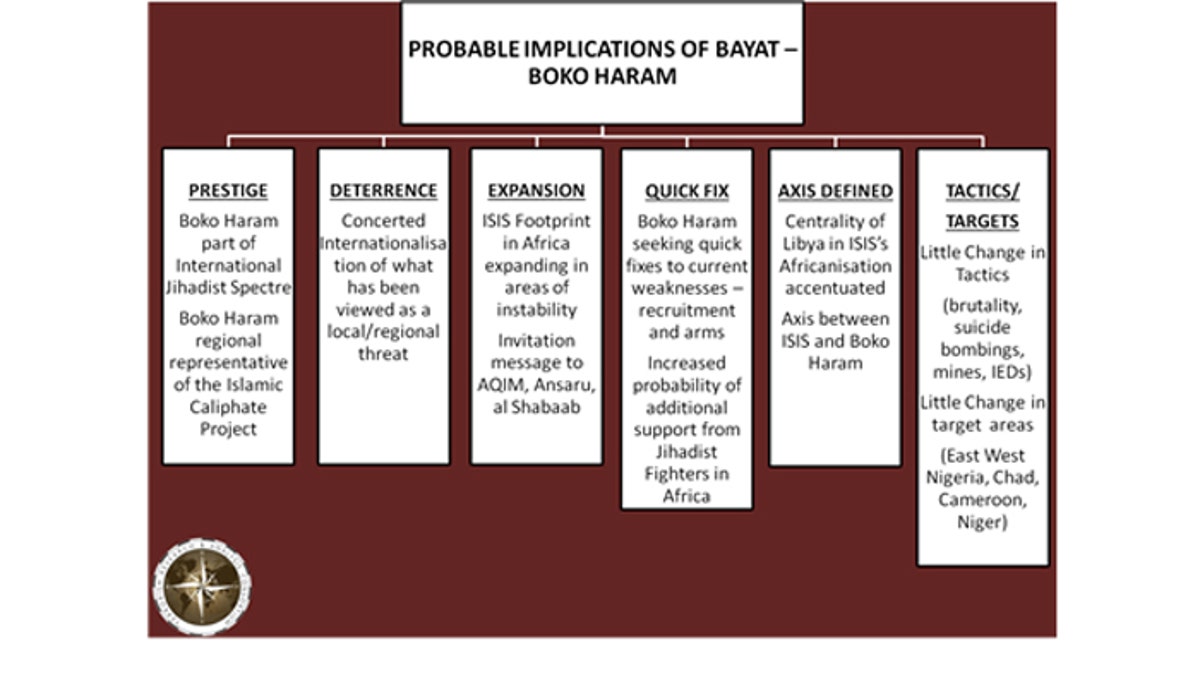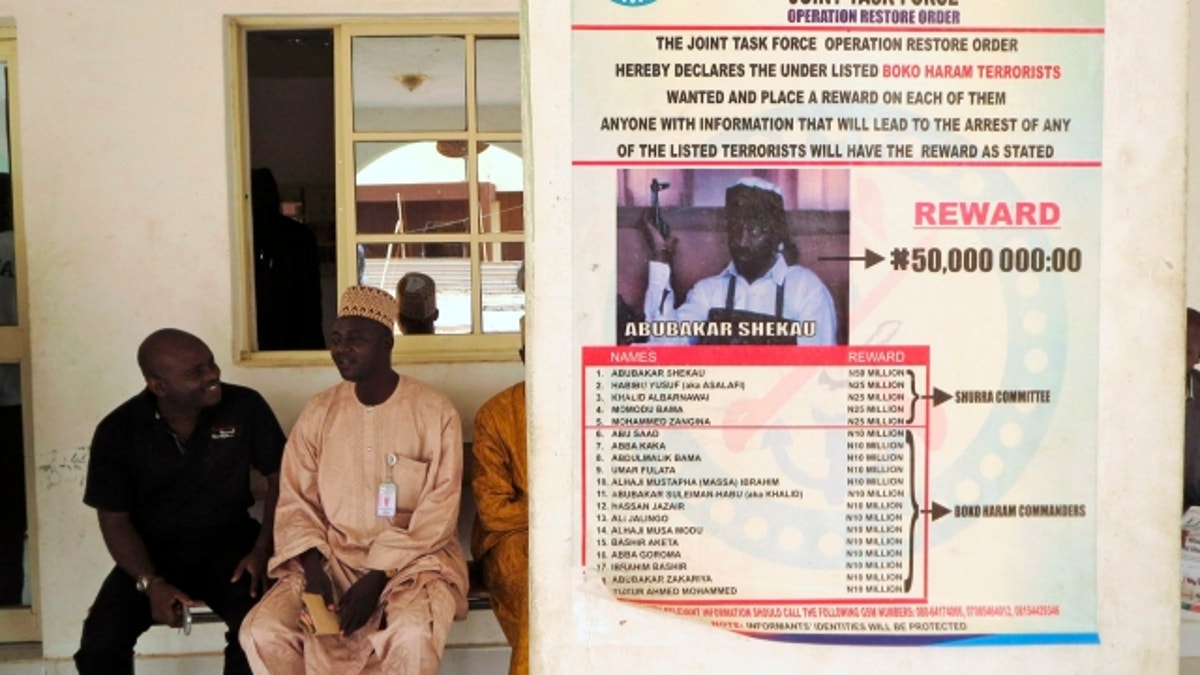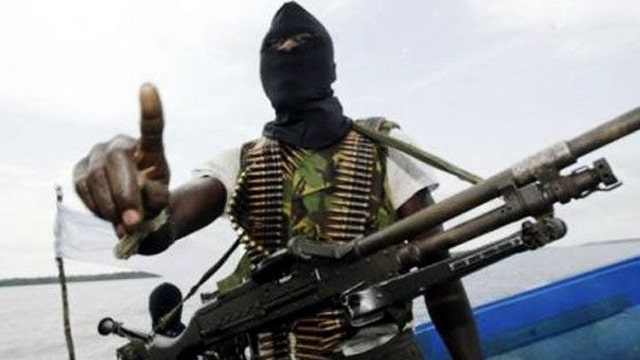Boko Haram takes page out of ISIS playbook
Nigerian Islamic terrorist organization releases new video Monday of two prisoner beheadings. Are they now working with ISIS? Plus, ISIS' expansion into Libya
By joining ISIS, Nigerian-based Islamic terror group Boko Haram has likely gained unprecedented power, resources and reach, according to intelligence experts.
“Boko Haram has entered the realm of international jihadism, and by so doing will gain prestige among the vast supporters of Islamic State.”
Boko Haram, which has driven some 3 million people from their homes in northeast Africa over the last five years, slaughtering whole villages, taking women and children slaves, and setting off lethal explosions in densely populated areas, made the announcement it was joining the Middle Eastern group on March 7 on an audio track translated into French and English. Leading terror experts in the U.S. and Africa said the announcement to become a part of ISIS, a group that has horrified the world by beheading, crucifying, stoning, pushing to their death and even burning alive innocent civilians across Syria, Iraq, Libya, Algeria, the Sinai Peninsula, and other parts of the Middle East, has far greater implications than just being a mere symbolic act.
“Boko Haram has entered the realm of international jihadism, and by so doing will gain prestige among the vast supporters of Islamic State,” said Veryan Khan, editorial director of Terrorism Research & Analysis Consortium (TRAC).

Conversely, ISIS, also known as Islamic State, will gain its first real step into Africa beyond mere cells, individual loyalties, and smaller less well-known groups, she said.
“Given the fact that Boko Haram not only controls large swaths of territory, holds hundreds and hundreds of hostages, and is the most successful terror operation out of Africa right now, ISIS has gained a real foothold,” Khan said.
The Islamic State must officially accept Boko Haram's “bay’ah” or pledge of allegiance to the Islamic State, though it is unlikely that ISIS leader Abu Bakr al-Baghdadi will deny it, considering his strategy of world expansion and control, said Jasmine Opperman, TRAC Director of African Operations.
Islamic State's focus remains Syria and Iraq but as seen in Libya, Africa will not escape the Islamic State's search for ever wider presence.
ISIS has flourished where there is weak governance and instability, and Africa has many such areas that could be seen as "lucrative markets,” Opperman said.

REFILE ADDING SLUG A poster advertising for the search of Boko Haram leader Abubakar Shekau is pasted on a wall in Baga village on the outskirts of Maiduguri, in the north-eastern state of Borno May 13, 2013. After a crackdown pushed them out of Nigeria's northern cities, Islamist militant group Boko Haram have regrouped, rearmed and are staging a bold comeback that has already allowed them to seize control over parts of the northeast. Using porous borders with Chad, Niger and Cameroon in the desolate scrubland around Lake Chad, they are smuggling bigger weapons, staging cross-border raids, killing and kidnapping in an escalation of violence that could further draw Nigeria's neighbors into its counter-insurgency fight, security officials say. Boko Haram, under the leadership of fiery, gun-toting militant Abubakar Shekau, is thought to be getting closer to achieving its dream of creating some kind of Islamic rule in the lawless areas around Lake Chad, where even the police have fled. To match Insight NIGERIA-ISLAMISTS-INSIGHT/ REUTERS/Tim Cocks (NIGERIA - Tags: CIVIL UNREST) (REUTERS)
“When the ISIS accepts the pledge it will be a clear message to other groups such as Ansaru, AQIM and al-Shabaab to join,” Opperman said. “That will allow an expansion into north and central Africa similar to what was seen since June 2014 in Iraq.”
The pledge also will elevate the profile of Boko Haram’s leader, Abubakar Shekau, attention that “Shekau so desperately seeks,” Khan said, comparing him to “witch doctor – part voodoo/part radical Islam,” but noting he has had an image “makeover” in recent weeks.
“By Boko Haram pledging to the Islamic State, Shekau has secured a safe haven for Boko Haram's leadership. Even if the current Nigerian offensives are to succeed, a temporary escape could be made to another IS stronghold from where Boko Haram's life cycle can be maintained irrespective of distance,” Khan said.
Boko Haram’s pledge could be an attempt at seeking quick fixes to two areas they are currently struggling with, namely, recruitment and access to arms, Opperman said.
“Boko Haram is now part and parcel of the ISIS-aligned international jihadist threat,” Opperman said. “Any deterring operation will have to take into account Boko Haram, and that means greater international involvement in an area already overwhelmed by foreign presence and interests.”
While the pledge doesn’t hand the reigns of evil completely to ISIS, “ISIS will provide a strategy and directly guide on who to target, where to target and how to target,” Khan said.
The official pledge follows news FoxNews.com first reported March 2 that Boko Haram appeared to have aligned its media production, social media and execution style videos with ISIS, even placing the signature ISIS black flag in its videos on its military-style tanks.

